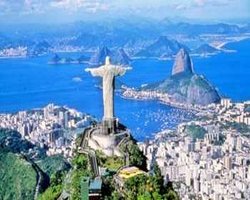Although the Brazilian economy is expanding again, the OECD (Organization for Economic Co-operation and Development) says the country still faces long-term challenges.
According to the OECS’s latest Economic Survey of Brazil 2013, Brazil is managing to do two things simultaneously: move up the ranks of the world’s largest economies and make economic growth progressively more inclusive.
The OECD wrote “Renewed economic dynamism will allow it to continue converging with more advanced economies and ensuring that disadvantaged groups share in the benefits of future growth.”
The Economic Survey, which was presented in Brasilia, shows how the country can build on past achievements and pave the way for more solid and sustainable growth in the years ahead.
Brazilian economy reaping the benefits
OECD Secretary-General Angel Gurría said:
“Brazil is reaping the benefits of years of reforms that have delivered greater economic prosperity and a fairer distribution of the benefits of growth among the population. Growth and sensible policies have allowed 40 million people to join the middle class over the last decade. Now the challenge is to create the conditions that will allow further improvements to living standards and sustained reductions in income inequality in a sound macroeconomic environment.”
The authors of the report praise the Brazilian economy for building on solid fiscal and monetary policy frameworks.
It is important the country now build on its hard-won reputation by managing the public finances in a transparent, clear, and predictable manner.
In order to bring inflation back to its 4.5% target, Brazil’s central bank needs to continue with its tight monetary policy.
Brazilian economy must boost competitiveness and productivity
The economic pie can be further expanded by boosting productivity and competitiveness in Brazilian companies, the Survey adds.
In order to improve competitiveness and productivity, Brazil needs to:
- Improve infrastructure.
- Improve the business environment.
- Streamline a currently burdensome tax system.
- Open up investment and trade opportunities where all may participate in a well regulated level playing field.
Education and skills training are vital priorities in the fight against poverty and inequality.
While social policies that focused on reducing income disparities and poverty have borne fruit, Brazil needs to focus more on proven programs that reduce poverty most effectively.
According to the Economic Times, Brazil is planning to develop state-of-the-art combat aircraft with the Russian Federation.
Brazil – some facts
- Population – 201 million.
- Area – 8,515,767 km2.
- GDP – $2.356 trillion (Word’s 7th largest).
- Income per capita – $11,875.
- Currency – Real.
- Largest cities (in order) – Sao Paulo, Rio de Janeiro, Salvador, Brasilia, Fortaleza, Belo Horizonte, Manaus and Curitiba.
- Language – Portuguese.
- The world’s largest coffee producer (one third of global production). It is also the world’s largest producer of sugar cane.
- The largest companies in Brazil (in order) are: Petrobras, Banco do Brasil, Banco Bradesco, Vale, Itausa Investimentos, Ultrapar Holdings, and Brazilian Distribution (Companhia Brasileira de Distribuição).
Market Business News reported on how Latin American economic outlook has changed after ten years of relatively strong growth.

